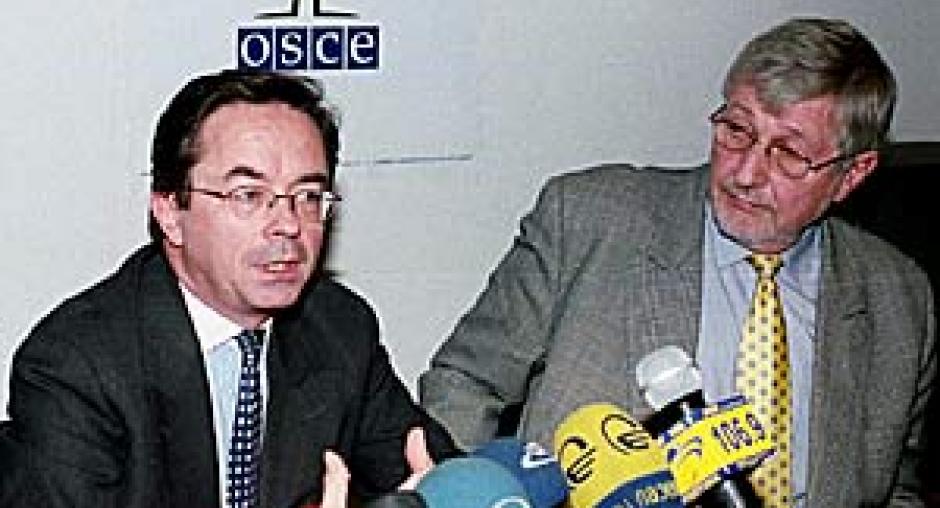Newsroom
OSCE human rights chief calls for dialogue between authorities and civil society in Georgia
TBILISI/WARSAW 10 March 2004

(OSCE)Christian Strohal (left), Director of the OSCE's Office for Democratic Institutions and Human Rights, and Roy Reeve, Head of the OSCE Mission to Georgia, at a press conference in Tbilisi, 10 March 2004. (OSCE) Photo details
TBILISI/WARSAW, 10 March 2004 - A sustained and close dialogue is needed between the Georgian authorities, non-governmental organizations and the international community to promote human rights and democracy, said Ambassador Christian Strohal, Director of the OSCE's Office for Democratic Institutions and Human Rights (ODIHR), at the end of a two-day visit to Tbilisi.
In his meetings with Georgian officials, including Prime Minister Zurab Zhvania and Speaker of Parliament Nino Burjanadze, as well as other high-ranking government officials, Ambassador Strohal discussed a number of challenges for Georgia's new leadership, including preparations for the 28 March parliamentary elections, issues of legal reform, and the ongoing anti-corruption campaign. He underscored the need to remain within the legal framework of Georgia and uphold respect for international commitments.
Ambassador Strohal stressed that the "Rose Revolution" represents a fresh start for Georgian society.
"This opportunity should be used to fundamentally change the relationship between the government and the governed, and civil society must remain included in the discussions of governmental initiatives as well as of assistance programmes", he said. "This concerns not only a small number of non-governmental organizations but a variety of stakeholders, interest groups and the wider public."
The OSCE/ODIHR has been involved in a series of projects promoting human rights and democracy in Georgia for the last decade and has also monitored parliamentary and presidential elections in the country.
The ODIHR Director underscored that the lessons learned from the previous efforts of the international community to promote democracy in Georgia have to be taken into account when designing the new programmes.
He emphasized that his Office stands ready to work with both domestic stakeholders and international partners on developing the agenda for the promotion of democracy in Georgia, and welcomed the fact that Georgia's government can now benefit from the experience of the country's vibrant civil society, given that a number of former NGO leaders have joined it.
"A genuine and long-term partnership between the government, civil society, and the international community will lead to increased effectiveness of assistance efforts. It will help us to develop a common vision on priorities for accelerating the democratic process and make its results sustainable," said Ambassador Strohal. He also called for national institutions to take ownership over co-ordinating and prioritizing assistance efforts.
In his meetings with Georgian officials, including Prime Minister Zurab Zhvania and Speaker of Parliament Nino Burjanadze, as well as other high-ranking government officials, Ambassador Strohal discussed a number of challenges for Georgia's new leadership, including preparations for the 28 March parliamentary elections, issues of legal reform, and the ongoing anti-corruption campaign. He underscored the need to remain within the legal framework of Georgia and uphold respect for international commitments.
Ambassador Strohal stressed that the "Rose Revolution" represents a fresh start for Georgian society.
"This opportunity should be used to fundamentally change the relationship between the government and the governed, and civil society must remain included in the discussions of governmental initiatives as well as of assistance programmes", he said. "This concerns not only a small number of non-governmental organizations but a variety of stakeholders, interest groups and the wider public."
The OSCE/ODIHR has been involved in a series of projects promoting human rights and democracy in Georgia for the last decade and has also monitored parliamentary and presidential elections in the country.
The ODIHR Director underscored that the lessons learned from the previous efforts of the international community to promote democracy in Georgia have to be taken into account when designing the new programmes.
He emphasized that his Office stands ready to work with both domestic stakeholders and international partners on developing the agenda for the promotion of democracy in Georgia, and welcomed the fact that Georgia's government can now benefit from the experience of the country's vibrant civil society, given that a number of former NGO leaders have joined it.
"A genuine and long-term partnership between the government, civil society, and the international community will lead to increased effectiveness of assistance efforts. It will help us to develop a common vision on priorities for accelerating the democratic process and make its results sustainable," said Ambassador Strohal. He also called for national institutions to take ownership over co-ordinating and prioritizing assistance efforts.
